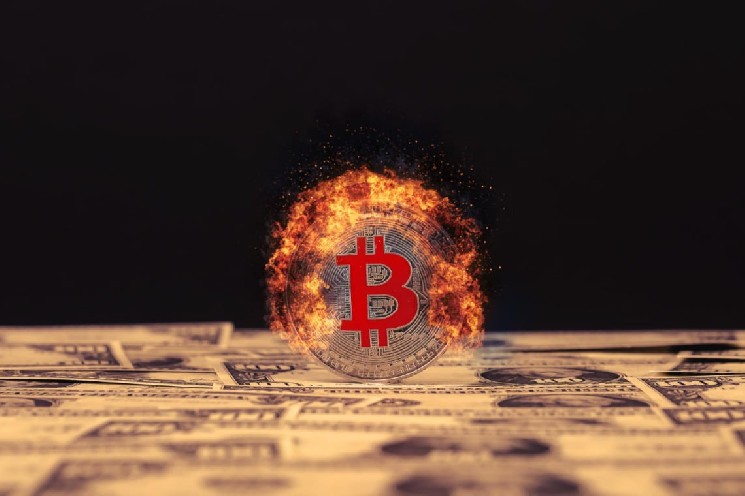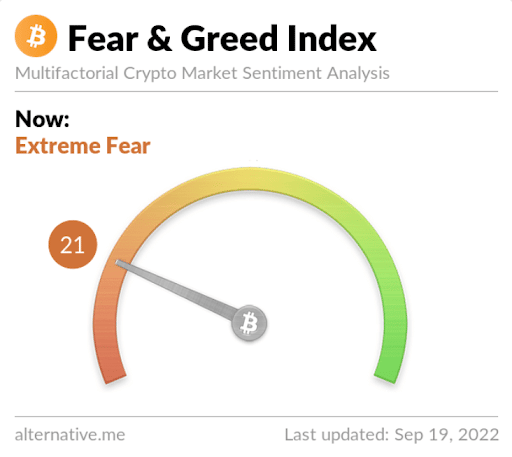Bitcoin’s overall sentiment is decidedly negative

Indicators and Google searches indicate that general Bitcoin sentiment is very pessimistic.
Summary
- Bitcoin’s sentiment trend is still negative
- The relationship between sentiment and asset price
Bitcoin’s sentiment trend is still negative
As is shown by a tweet from Jameson Loop, a big Bitcoin supporter and co-founder of Casa, most Google suggestions redirect to negative searches:
Bitcoin is. pic.twitter.com/dJoXCPz7ko
— Jameson Lopp (@lopp) September 18, 2022
The first is “Bitcoin is dead“. As of 18 June, this search term had reached an ATH of 100/100, according to Google Trends.
Not surprisingly, it perfectly coincided with the end of the first major bearish phase, when BTC had retested $19,000 support for the first time since December 2020.
In fact, there is an indicator on the 99bitcoins portal that reports the number of Bitcoin deaths over the time period in question.
A “Bitcoin Obituary” is defined as any content that explicitly expresses the end of Bitcoin, describing it, for example, as useless or worthless.
To date, Bitcoin has died 461 times. The last one was on 3 July 2022 and was recorded by the following tweet:
There will come a day when you wish you sold #Bitcoin for $20,000!
Take a look at the historic chart to see how far of a fall is possible, if you are interested in risks associated with an unraveling Ponzi scheme.
— Peter ⚒ Spina | Greek mode | Gold & Silver Maxim. (@goldseek) July 3, 2022
The phrase that made this statement qualify as an obituary was:
“Bitcoin is an Unraveling Ponzi Scheme”.
It is no coincidence that this research is back in fashion, just now that the value of BTC has broken a new support, pushing below $18,500.
This could be technical confirmation of a bearish pattern, which could drag Bitcoin toward $10,000, a level hailed by many analysts.
Another important factor that adequately summarizes Bitcoin’s market sentiment is the well-known Fear & Greed Index.
Currently, it stands at 21, which indicates Extreme Fear on the part of investors.

Level reported by the Fear & Greed index
This situation occurs precisely in persistent bearish phases, or following a series of negative events.
The relationship between sentiment and asset price
Unfortunately, people’s views are closely influenced by asset prices. If these fall, then it results almost instantly in a loss of investor confidence.
In this case, however, in the same way that one assesses the future potential of a company, one should analyze the underlying technology and the capabilities of the ecosystem to meet a given need in the market.
This will provide a more or less adequate estimate of the intrinsic value of the asset under consideration, lending some additional level of rationality to investment decisions.
Most people do not do this and allow themselves to be guided by the strong emotions of the moment, such as the famous FOMO (Fear Of Missing Out), fear, greed, or simply uncontrolled general hype.
This explains why almost all retail investors buy when the price is high, and sell when the price is low.






 Bitcoin
Bitcoin  Ethereum
Ethereum  Tether
Tether  USDC
USDC  TRON
TRON  Dogecoin
Dogecoin  Cardano
Cardano  Bitcoin Cash
Bitcoin Cash  Monero
Monero  Chainlink
Chainlink  LEO Token
LEO Token  Stellar
Stellar  Zcash
Zcash  Litecoin
Litecoin  Hedera
Hedera  Dai
Dai  Cronos
Cronos  Tether Gold
Tether Gold  OKB
OKB  Ethereum Classic
Ethereum Classic  KuCoin
KuCoin  Cosmos Hub
Cosmos Hub  Gate
Gate  Algorand
Algorand  Dash
Dash  VeChain
VeChain  Tezos
Tezos  Stacks
Stacks  TrueUSD
TrueUSD  Decred
Decred  IOTA
IOTA  Theta Network
Theta Network  Basic Attention
Basic Attention  NEO
NEO  Synthetix
Synthetix  Qtum
Qtum  0x Protocol
0x Protocol  Ravencoin
Ravencoin  DigiByte
DigiByte  Zilliqa
Zilliqa  Nano
Nano  Siacoin
Siacoin  Holo
Holo  Numeraire
Numeraire  Waves
Waves  Enjin Coin
Enjin Coin  Ontology
Ontology  Status
Status  BUSD
BUSD  Hive
Hive  Pax Dollar
Pax Dollar  Lisk
Lisk  Steem
Steem  Huobi
Huobi  OMG Network
OMG Network  Bitcoin Gold
Bitcoin Gold  NEM
NEM  Augur
Augur